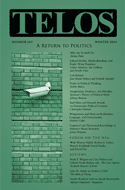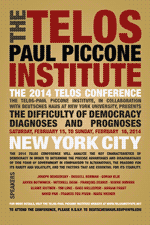If we want to gain a deeper understanding of the specific relationship between the ethical and the political in current times, we have to talk about the mediating agencies that enable this relationship. And if what the announcement for the Telos Conference 2016 in New York states were really true, namely, that at “the theoretical level, political reality has come to be seen as divorced from ethical life,” we need to ask: what has happened to these mediating agencies? That is exactly what the German philosopher Max Horkheimer was doing with his racket theory. He never explicitly referenced the “ethical” as a philosophical category. Yet he was able to show that in post-liberal societies, the social instances that made the relationship between the political and the ethical possible in the first place, are being destroyed—or they are at least tending towards a loss of their reflexive function. For Horkheimer this is at the core of what he called the racket society: that ultimately, every reference to universality and to society, or in German to the Allgemeinheit, is lost.
|
With the publication of “The Crisis of Western Societies” (1982), Cornelius Castoriadis returns to an early theme in his work by proposing that over the previous twenty years Western societies had begun to enter a new phase, one that could be considered to be a situation of crisis. In his earlier political thought—associated with Socialisme ou Barbarie—Castoriadis identified signs of a transition into this new phase, marked by a widespread bureaucratization of political decision-making that emerged alongside a general turn toward the privatization of social life. At the time of his revisitation of this theme, Castoriadis’s work had undergone what would be the first of two ontological turns: a turn that involved a radical rethinking of historicity, which understood the historical dimension of society as a socially contingent mode of creation that is central to the constitution of the world of a given society. This article reflects an articulation of his previous theme of crisis with regard to this broader rethinking of historicity throughout the 1970s, which extended political analysis into more foundational issues of social institution and cultural expression. Michel Houellebecq’s novel Submission raises important questions about the cultural crises of modernity. It reflects on the dialectics of post-secularism and post-democracy in ways that have become particularly salient in light of the terror attacks in Paris and San Bernadino. Beginning with Vincent Lloyd’s post today, TELOSscope presents a series of discussions of the novel that will appear over the next several days. The violence of November 13, 2015, in Paris was met with an avalanche of grief and sympathy from around the world. Similar feelings followed the attack on Charlie Hebdo several months earlier. Paris is an iconic and beloved city; to see blood and bullet holes on the streets of Paris caused pain. Or rather, it causes professions of emotion. In an age of personal mediation, when we are expected to advertise our feelings about world events nearly in real time through tweets and Facebook posts, it is an open question how much feelings are felt—though they are most certainly performed. Affect circulates with ever increasing velocity, but such affect is increasingly shallow, more like a shared way of talking than anything having to do with inwardness. This does not mean mediated emotions are insignificant. As leftist critics of such public mourning charge, shared ways of talking about the world lead to shared ways of seeing the world and can ultimately legitimate violent ways of acting in the world. Johnny Brennan’s “Imagination, Prophecy, and Morality: The Relevance and Limits of Spinoza’s Theory of Political Myth” appears in Telos 169 (Winter 2014). Read the full version online at the Telos Online website, or purchase a print copy of the issue in our store. Telos 169 (Winter 2014) is now available for purchase in our store. The following paper was presented at the Eighth Annual Telos Conference, held on February 15–16, 2014, in New York City. |
||||
|
Telos Press Publishing · PO Box 811 · Candor, NY 13743 · Phone: 212-228-6479 Privacy Policy · Data Protection Copyright © 2025 Telos Press Publishing · All Rights Reserved |
||||
 How should we understand myth in the political realm? Some see myth as a dangerous form of regression that allows its utilizers to reorient the consciousness of a population toward dangerous ends. Others see myth as a necessary spark to incite revolutionary progress; myth brings with it the emotional charge needed to unite a population into action. Yet others see myth as a set of training wheels helpful for grasping more difficult and abstract concepts—training wheels which some are never meant to take off. Spinoza stands unique in that he is able to incorporate all of these dimensions of political myth. His motivating question is not what myth is, but rather what are its legitimate uses. Myth can be progress, but used improperly can also lead to regression. Myth relies on the basest form of knowledge in order to be able to communicate to all people, but cannot last if it is blindly accepted. Myth, for Spinoza, is inseparable from our lives and from society; it is a part of our mental construction and in that manner can be used for progress. But myth also has its limits, and should it surpass those limits it can lead to a culture of superstition that will regress to more primitive forms. Spinoza’s is a more successful theory of political myth because it is more accepting of, and true to, the way myth acts in our individual and social lives.
How should we understand myth in the political realm? Some see myth as a dangerous form of regression that allows its utilizers to reorient the consciousness of a population toward dangerous ends. Others see myth as a necessary spark to incite revolutionary progress; myth brings with it the emotional charge needed to unite a population into action. Yet others see myth as a set of training wheels helpful for grasping more difficult and abstract concepts—training wheels which some are never meant to take off. Spinoza stands unique in that he is able to incorporate all of these dimensions of political myth. His motivating question is not what myth is, but rather what are its legitimate uses. Myth can be progress, but used improperly can also lead to regression. Myth relies on the basest form of knowledge in order to be able to communicate to all people, but cannot last if it is blindly accepted. Myth, for Spinoza, is inseparable from our lives and from society; it is a part of our mental construction and in that manner can be used for progress. But myth also has its limits, and should it surpass those limits it can lead to a culture of superstition that will regress to more primitive forms. Spinoza’s is a more successful theory of political myth because it is more accepting of, and true to, the way myth acts in our individual and social lives.  Two french communist authors recently devoted a book to an attempt at the systematic demolishment of the logic of democracy. What makes their gesture interesting is that their critique of democracy is made in the very name of autonomy, equality, and emancipation, that is, of the very principles that democracy is supposed to promote and uphold. One usually knows how to react to attacks on democracy coming from the other side, from those who ground their arguments in a celebration of some sort of hierarchy principle, those who deduce the political from an ontology of violence, or aim at naturalizing orders and political differences. In those cases there is usually not much to be said at all, because anti-democratic arguments are usually not recognized as belonging to the same conversation as democratic ones: when they are actually heard, anti-democratic arguments are usually subject to different logics of validation, enunciation and justification than democratic ones. This is for instance what the notion of extremism generally does: to locate a voice or an argument outside of the recognized universe of discourse, and hence somehow deprived of an equal standing, possibly subject to some version of the old Jacobin motto: “there shall be no freedom for the enemies of freedom.” The paradox is interesting in itself, because it betrays the presence of a certain politics of thought and speech that is already at work way before we get to discuss in a rational process the truths of political forms, and yet has substantial effects on what is heard (and not heard) in the supposedly transparent sphere of public discourse. It also forces us to recognize the recurring, foundational role of the limit, of the gesture that at the same time opens up and delimits the space of what is possible and what is acceptable, which is often overlooked or simplified in the context of democratic theory.
Two french communist authors recently devoted a book to an attempt at the systematic demolishment of the logic of democracy. What makes their gesture interesting is that their critique of democracy is made in the very name of autonomy, equality, and emancipation, that is, of the very principles that democracy is supposed to promote and uphold. One usually knows how to react to attacks on democracy coming from the other side, from those who ground their arguments in a celebration of some sort of hierarchy principle, those who deduce the political from an ontology of violence, or aim at naturalizing orders and political differences. In those cases there is usually not much to be said at all, because anti-democratic arguments are usually not recognized as belonging to the same conversation as democratic ones: when they are actually heard, anti-democratic arguments are usually subject to different logics of validation, enunciation and justification than democratic ones. This is for instance what the notion of extremism generally does: to locate a voice or an argument outside of the recognized universe of discourse, and hence somehow deprived of an equal standing, possibly subject to some version of the old Jacobin motto: “there shall be no freedom for the enemies of freedom.” The paradox is interesting in itself, because it betrays the presence of a certain politics of thought and speech that is already at work way before we get to discuss in a rational process the truths of political forms, and yet has substantial effects on what is heard (and not heard) in the supposedly transparent sphere of public discourse. It also forces us to recognize the recurring, foundational role of the limit, of the gesture that at the same time opens up and delimits the space of what is possible and what is acceptable, which is often overlooked or simplified in the context of democratic theory. 

